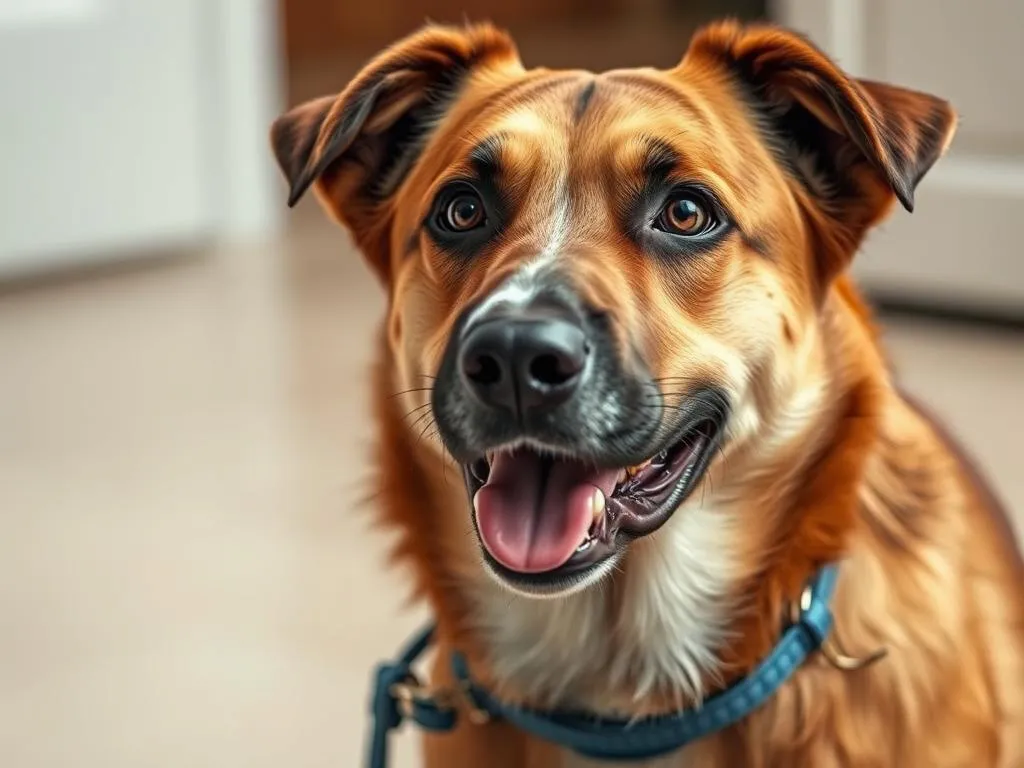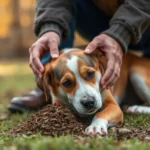
Introduction
Many dog owners face the distressing situation of seeing their beloved pets terrified of loud noises, such as thunderstorms, fireworks, or even construction sounds. This common issue, known as noise anxiety, can severely impact a dog’s quality of life, leading to stress, behavioral problems, and in severe cases, health issues. Addressing what to do if your dog is scared of loud noises is crucial for both the pet’s well-being and the owner’s peace of mind. This article dives deep into understanding noise anxiety from a veterinary perspective and offers practical strategies for managing this condition.
Understanding Noise Anxiety in Dogs
What is Noise Anxiety?
Noise anxiety is an intense fear or phobia that some dogs experience in response to loud sounds. This condition can manifest in various ways, including:
- Hiding: Dogs may seek refuge in small, enclosed spaces where they feel safer.
- Barking: Increased vocalization can occur as a response to fear.
- Shaking: Physical trembling is a common reaction to anxiety.
- Destructive behavior: Some dogs may chew furniture or scratch doors in their panic.
Recognizing these signs is the first step in understanding how to effectively manage your dog’s fear.
Causes of Noise Anxiety
Multiple factors contribute to noise anxiety in dogs:
- Genetic predisposition: Certain breeds, such as herding dogs, are more prone to anxiety.
- Early life experiences: Puppies that are not properly socialized may develop fears as they grow.
- Environmental factors: Traumatic events related to loud noises can lead to long-lasting anxiety.
Understanding these causes is essential for developing a comprehensive plan to help your dog.
The Impact of Loud Noises on Dogs
Physical Reactions
When faced with loud noises, dogs can exhibit various physical stress responses. These include:
- Increased heart rate: The body’s natural response to fear can lead to elevated heart rates.
- Cortisol levels: Prolonged exposure to anxiety-inducing sounds can result in elevated cortisol levels, leading to health issues such as obesity or a weakened immune system.
Behavioral Changes
Noise anxiety can also lead to significant behavioral changes in dogs. Some common effects include:
- Changes in eating habits: Stressed dogs may refuse to eat or overeat.
- Altered sleep patterns: Anxiety can cause insomnia or excessive sleeping.
- Development of other anxiety-related behaviors: Dogs may become more aggressive or withdrawn as their anxiety escalates.
Recognizing these impacts allows owners to take timely action to help their dogs.
Vet Recommendations for Managing Noise Anxiety
Initial Assessment
If you suspect your dog suffers from noise anxiety, it’s crucial to consult a veterinarian for a proper diagnosis. During the visit, your vet may ask questions such as:
- When did you first notice the anxiety?
- What specific sounds trigger the fear?
- How does your dog typically react to loud noises?
Answering these questions can help your vet devise a tailored management plan.
Behavioral Modification Techniques
Several effective behavioral modification techniques can help manage noise anxiety:
- Desensitization: This involves gradually exposing your dog to recorded sounds at low volumes, increasing the volume over time as your dog becomes more comfortable.
- Counter-conditioning: Pairing loud sounds with positive experiences, such as treats or playtime, can help change your dog’s emotional response to the noise.
- Safe spaces: Designating a quiet, comfortable area where your dog can retreat during loud events can provide a sense of security.
Implementing these techniques can significantly reduce your dog’s anxiety over time.
Medication Options
In some cases, medication may be necessary to manage noise anxiety effectively. Some common options include:
- Anxiolytics: These medications help reduce anxiety.
- Sedatives: These can calm your dog during particularly stressful events.
Always consult your veterinarian before administering any medication to ensure it’s appropriate for your dog’s specific needs.
Home Remedies and Natural Solutions
Calming Aids
There are several calming aids available that can help alleviate noise anxiety:
- Anxiety wraps: These snug-fitting garments apply gentle pressure to help calm anxious dogs.
- Essential oils: Certain oils, such as lavender, can promote relaxation. However, ensure that any oils used are safe for pets, as some can be toxic.
Utilizing these calming aids can create a more peaceful environment for your dog during loud events.
Environmental Adjustments
Making adjustments to your dog’s environment can also help mitigate anxiety:
- Soundproofing: Adding rugs, curtains, and other sound-absorbing materials can help muffle loud noises.
- Distractions: Providing interactive toys or puzzles can keep your dog engaged and distracted during stressful times.
These modifications can significantly improve your dog’s comfort level during loud events.
Preparing for Loud Events
Tips for Pet Owners
Planning ahead for predictable events, such as fireworks on the Fourth of July, is key:
- Noise kit: Create a ‘noise kit’ containing calming aids, favorite toys, and treats, so you’re prepared when loud noises occur.
- Stay calm: Your demeanor can influence your dog’s response. Remaining calm and reassuring can help your dog feel more secure.
Being proactive can make a considerable difference in how your dog copes with loud noises.
Community and Support
Connecting with other pet owners can provide invaluable support and resources:
- Support groups: Online forums or local groups can offer advice from those with similar experiences.
- Sharing experiences: Discussing your challenges and solutions can help you find new strategies to manage your dog’s anxiety.
Building a support network can ease the burden and provide effective strategies for managing noise anxiety.
When to Seek Professional Help
Identifying Severe Cases
In some instances, noise anxiety can escalate to severe levels, necessitating professional intervention. Signs that warrant a visit to a veterinary behaviorist may include:
- Extreme panic: If your dog is excessively panicking or cannot be calmed.
- Self-harm: If your dog is injuring itself due to stress, immediate help is needed.
Recognizing these signs is crucial for ensuring your dog’s safety and well-being.
Ongoing Management Plans
After consulting a veterinarian, establishing an ongoing management plan is essential. This may involve:
- Regular follow-ups: Continuous evaluation of your dog’s response to treatment is vital.
- Adjusting strategies: Be open to modifying your approach based on your dog’s progress.
A collaborative approach with your veterinarian can lead to a successful long-term management plan.
Conclusion
Noise anxiety in dogs is a significant issue that can affect both pets and their owners. Understanding the underlying causes, recognizing the impact of loud noises, and implementing effective management strategies are crucial steps in helping your dog cope. By consulting a veterinarian and utilizing behavioral modifications, calming aids, and environmental adjustments, you can create a supportive atmosphere for your furry friend. Remember, addressing what to do if your dog is scared of loud noises requires patience and persistence, but with the right approach, you can help your pet live a more peaceful life.









